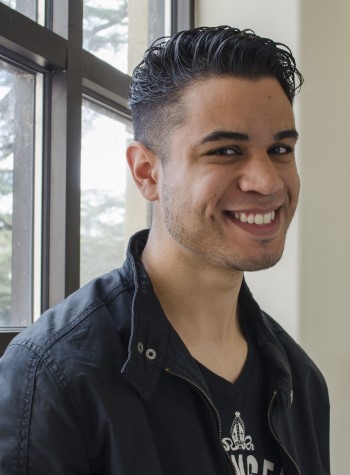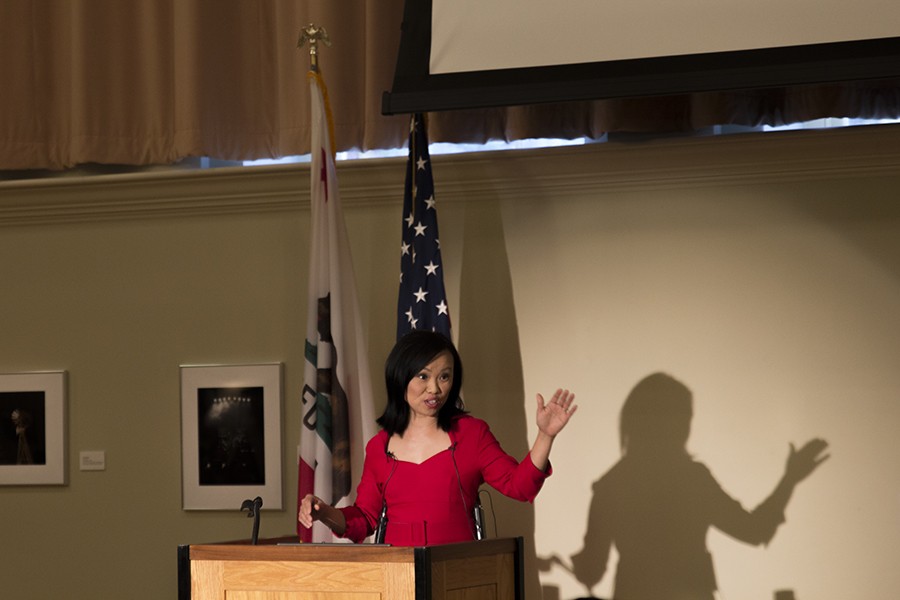Zoua Vang Tells an American Story of Hardship, Resilience and Survival
Photo by: David Chavez
Journalist Zoua Vang speaks about her Asian heritage during an event in the Old Administration Building room 251 on April 29, 2016.
Can an immigrant who comes to the U.S. with nothing — no education, no literacy, no English language and no money — achieve the American dream?
For Zoua Vang, a communications consultant, the answer is a resounding yes. In her “Secrets of Becoming American” presentation in OAB Room 251 on April 29, Vang told a story of sacrifice, hardship, loss and triumph and of her family’s journey to America, and their climb from abject poverty to success.
It’s my personal story, and if I can bring it to the forefront and share what it means to be an American,” she said, “it’s a process, it’s a feeling, it’s what you do, it’s what you say.”
Vang’s story started in Laos where she was born and the CIA’s 13-year secret war that destroyed the lives of the villagers. The U.S. government wanted influence in Laos and used locals to achieve it. Her father, then a teenager, enlisted to save his own father from the hardship.
She told about the tolls of the war on the simple villagers — of bombs and explosions and injuries and death. She recalled an incident when her mother was believed to have been killed in an air raid and how her older siblings thought they would never see her again. Her mother would eventually return home, and life continued.
Despite the war conditions and chaos, Vang said the villagers, who were farmers, lived a cycle of tending the crops and then running, only to return to tending the crops again.
In 1975, the U.S. left Laos and their lives descended into craziness and deprivation; as the U.S. benefactors were no longer “raining rice anymore and there weren’t guns falling from the sky.”
Because of her father’s service, Vang and her family were hunted once the Americans left. They would hide in caves during the day and run during the night. They finally made it to Thailand with America as the next planned destination.
Despite the scary stories they heard about America, Vang says her parents were willing to become nobody so their children could become somebody,
Vangs said upon their arrival to their new country, it is as if her parents were blind and deaf — blind because they could not read, and deaf because they could not communicate efficiently because of the language barrier.
Daily survival was hard for Vang and her family of nine. The government did help with a little aid, but it was barely enough. She recalled how she and her siblings would rummage through the school dumpsters to collect aluminum foil and trays in order to get some extra money.
Then her family worked on the farms picking cherries, grapes, tomatoes — whatever was in season. They toiled and earned very little in exchange.
Vang said she could tell life was becoming a little more manageable; her parents had learned how to drive and would occasionally buy the children a candy bar. However, the seven children would have to share a single Snickers bar. She recalls how McDonald’s and Pizza Hut were some of the first restaurants they ever went to.
Vang spoke about the humiliation her family suffered routinely, and how her father was accused of theft by a gas station attendant who called the police on him. Her father had not gotten the correct change back after his transaction and when he asked the cashier, she threatened to call the police. Her father retorted that he would call Channel 47.
The attendant went ahead and called the cops but her father did not know the phone number for Channel 47 but called his children instead. They were able to explain the situation to the officers and the money was returned.
She said that it felt so unjust that her father who had gone to war on behalf of America and had been cheated his whole life was being cheated again, in the U.S. She said immigrants are often mistreated because of superficial differences.
“I think that we have so much more in common than we don’t,” Vang said. “It makes me sad as an American when we talk about ‘us versus them’ when we’re really all the same.”
Vang’s parents had a total of 12 children; five died during the war and there are seven left. Although her parents were both illiterate, all seven children graduated from college. Among them is a physician, an attorney, an accountant, a journalist — all are successful and very involved in their communities.
Vang was a reporter for KSEE24 from 1999 to 2004 and is recognized as the first television reporter of Hmong origin in mainstream media in the U.S. She became a policy and communication director for First 5 of Fresno County from 2005 to 2013.
Vang has won two Associated Press awards for her documentaries, and is now a communications consultant and a full-time mom. She is also an adviser for Fresno State President Joseph Castro. She serves on the Fresno City College’s journalism advisory board.
FCC instructor and Fresno’s Poet Laureate Lee Herrick said that having Vang tell her story was a success.
“The goal for tonight was allow Zoua Vang to tell her powerful, uplifting and inspirational story to the community,” Herrick said. “She is an amazing role model and an inspiration for everybody.”
Vang said she is forever grateful to her parents and knows firsthand the experiences and fears many immigrants have faced and are still facing today. Her parents’ story, she said, is a typical immigrant story — of making huge sacrifices for the sake of the next generation.
“I can laugh, because they cried. They went hungry, so I can be fed,” Vang said. “They became nobody, so that I can become somebody.”

David Chavez is 25 and is in his sixth semester taking classes at Fresno City College. He is a journalism student and he plans to finish with a bachelor's...

